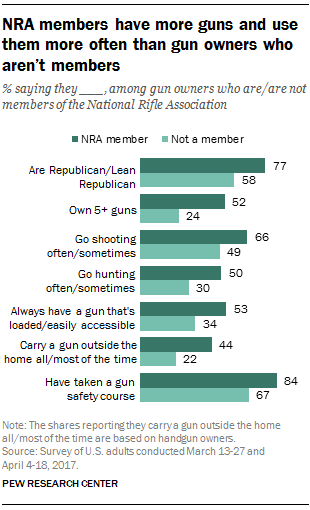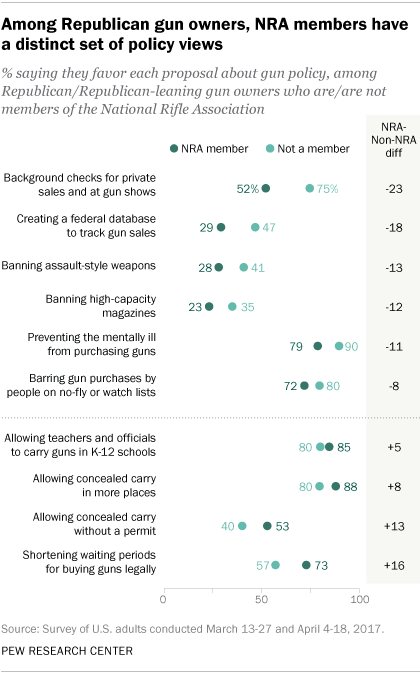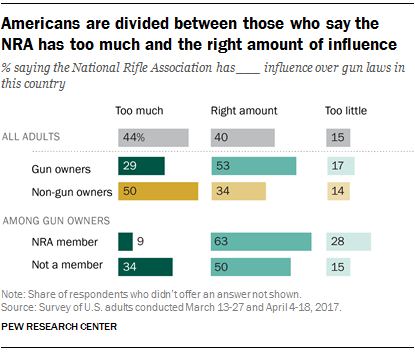Three-in-ten U.S. adults say they currently own a gun, and of that group, 19% say they belong to the National Rifle Association. While the demographic profile of NRA members is similar to that of other gun owners, their political views, the way they use their firearms and their attitudes about gun policy differ significantly from gun owners who are not members of the organization.
 A majority of gun owners (61%) are Republicans or lean to the Republican Party, but NRA members skew even more heavily to the political right than other gun owners. Roughly three-quarters (77%) of gun owners who say they belong to the NRA are Republicans or lean Republican, while only 20% are Democrats or lean Democratic. Among gun owners who do not belong to the NRA, by contrast, 58% are Republicans and 39% are Democrats. And among Republican gun owners, NRA members are much more likely than nonmembers to describe their political views as very conservative (29% vs. 18%).
A majority of gun owners (61%) are Republicans or lean to the Republican Party, but NRA members skew even more heavily to the political right than other gun owners. Roughly three-quarters (77%) of gun owners who say they belong to the NRA are Republicans or lean Republican, while only 20% are Democrats or lean Democratic. Among gun owners who do not belong to the NRA, by contrast, 58% are Republicans and 39% are Democrats. And among Republican gun owners, NRA members are much more likely than nonmembers to describe their political views as very conservative (29% vs. 18%).
Gun owners who say they belong to the NRA tend to own more guns, on average, than gun owners who don’t belong to the NRA: About half (52%) say they own five or more guns, compared with 24% of non-NRA members (38% of nonmembers say they own only one gun). NRA members also hunt and shoot with more frequency than gun owners who aren’t NRA members: 50% say they go hunting often or sometimes, compared with 30% of nonmembers; 66% of NRA members go shooting often or sometimes, versus 49% of nonmembers.
NRA members are also significantly more likely than other gun owners to say they have a gun that is loaded and easily accessible to them at all times (53% vs. 34%). And, among handgun owners, NRA members are twice as likely to say they carry a gun with them outside of their home all or most of the time (44% vs. 22%). They are also more likely to say they have taken a gun safety course at some point – 84% of NRA members have done this, compared with 67% of gun owners who don’t belong to the NRA.
Beyond the different ways in which they use their firearms, guns seem to have more personal salience for NRA members than for other gun owners. Nearly half (45%) of NRA members say owning a gun is very important to their overall identity; only 20% of non-NRA members say the same. And members of the NRA are nearly unanimous in their view that owning a gun is essential to their personal freedom: 92% of NRA members say this, compared with 70% of nonmembers.
Given their different partisan leanings, it’s not surprising that NRA members and nonmembers don’t always see eye-to-eye when it comes to gun policy. In general, Republicans and those leaning Republican tend to be less supportive of policy proposals that would restrict gun ownership and more supportive of policies that would expand gun rights than Democrats and those leaning Democratic.
 But even after controlling for partisanship, there are significant differences in policy views between Republican gun owners who say they belong to the NRA and those who don’t. About half (52%) of Republican gun owners who belong to the NRA, for instance, say gun laws in the U.S. should be less strict than they are now; 33% of Republican gun owners who don’t belong to the NRA share this view.
But even after controlling for partisanship, there are significant differences in policy views between Republican gun owners who say they belong to the NRA and those who don’t. About half (52%) of Republican gun owners who belong to the NRA, for instance, say gun laws in the U.S. should be less strict than they are now; 33% of Republican gun owners who don’t belong to the NRA share this view.
When it comes to specific policy proposals, the largest gap between the two groups is on the question of whether to institute background checks for private gun sales. Among Republican gun owners, 52% of NRA members favor this proposal, compared with 75% of nonmembers. There are also significant gaps on proposals to ban assault-style weapons and high-capacity magazines and to create a federal database to track gun sales, with NRA members much less likely to support each proposal.
When it comes to expanding gun rights, Republican NRA members are much more likely than Republican nonmembers to say they would support shortening waiting periods for buying guns and allowing people to carry a concealed weapon without a permit.
But there are also some areas of agreement between the two groups. Among Republican gun owners, large majorities of NRA members and nonmembers alike favor barring gun purchases by people on federal no-fly lists and the mentally ill, and they also favor expanding concealed carry laws in more places and allowing teachers and school administrators to carry guns in K-12 schools.
 To be sure, the NRA has been an active voice in debates over many of these policy proposals. And the public is divided when it comes to the amount of influence the NRA has over guns laws in the U.S.: While 44% of all adults say the NRA has too much influence over gun legislation, 40% say it has the right amount of influence. Relatively few (15%) say the NRA has too little influence.
To be sure, the NRA has been an active voice in debates over many of these policy proposals. And the public is divided when it comes to the amount of influence the NRA has over guns laws in the U.S.: While 44% of all adults say the NRA has too much influence over gun legislation, 40% say it has the right amount of influence. Relatively few (15%) say the NRA has too little influence.
For their part, NRA members are largely satisfied with the amount of influence the organization has over U.S. gun laws. About six-in-ten (63%) say the NRA has the right amount of influence and 28% say it has too little influence. Only 9% of NRA members say the organization has too much influence over gun laws. Among non-gun owners, 50% view the NRA as too influential.
When it comes to flexing their own political muscle, NRA members are much more active than gun owners who do not belong to the NRA. Some 46% of gun owners in the NRA say they have contacted a public official to express their opinion on gun policy, including 24% who have done so in the past 12 months. Far fewer gun owners who do not belong to the NRA have reached out to a public official regarding gun policy: 15% have ever done this, and just 5% have done this in the past 12 months.



